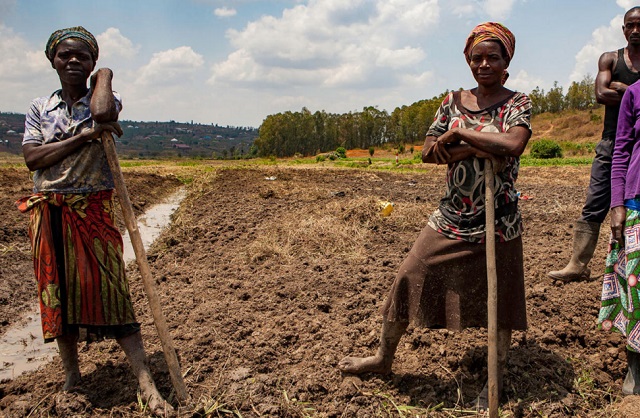
Critics say AGRA has been unable to provide evidence of its positive impacts
SPECIAL FEATURE | SETHI NCUBE | Africa’s largest food producer networks and their allies demand a decisive shift away from imported fossil-fuel-based fertilisers and chemicals and towards self-sufficient, ecological farming that revitalises soil and protects ecosystems.
Farmers and faith leaders made the call for donors of the Alliance for a Green Revolution in Africa (AGRA) to stop funding an initiative they says has failed to improve productivity, incomes, and food security ahead of AGRA’s annual forum held from September 5-9, in Kigali, Rwanda.
The forum attracted corporate executives, governments, and donors will gather, claiming “Bold Action for Resilient Food Systems”.
In July 2021, the United Nations sounded alarms with its 2020 hunger report, which documented a 25% increase from 2019 to 2020 in the number of severely undernourished people in the world.
Sub-Saharan Africa saw a similar spike with an estimated 44 million more people suffering severe hunger. COVID-19 and climate change were the proximate causes, but lagging productivity growth in agriculture contributed as well.
AGRA was founded 15 years ago to address that productivity problem. It was founded as an international NGO dedicated to addressing chronic hunger and poverty by increasing yields in key food crops through the expanded use of commercial seeds and fertilisers.
This is the “technology package” credited with raising agricultural productivity in what came to be known as the first Green Revolution in India and other parts of Asia and Latin America in the 1970s.
The alliance set two key ambitious goals to be achieved by 2020. The first was to double yields and incomes for 30 million smallholder farming households. The second was to reduce food insecurity by half.
Its focus countries are Uganda, Kenya, Tanzania, Rwanda, and Ethiopia in the East African Region, Mozambique, Malawi to the South, and Mali, Burkina Faso, Ghana, and Nigeria in West Africa. The focus is on maize, sorghum, millet, beans, rice, cassava, cow peas, Soy beans, and wheat.
Critics say AGRA has been unable to provide evidence of its positive impacts on productivity, incomes and food security in the countries it operates. Instead, they say, for a basket of staple crops, productivity increased just 18% over 12 years, practically the same rate as it had prior to the interventions by AGRA.
“That is nowhere near its goal of doubling productivity, a 100% increase,” the critics say in one report.
Poverty levels also remain high in these countries, particularly in rural areas. Most alarming, UN estimates of the number of severely “undernourished” people in those countries increased 31% since 2006, a far cry from cutting food insecurity in half. More recent UN figures show that the number of severely hungry people in sub-Saharan Africa as a whole has grown 50% since the alliance’s founding in 2006.
AGRA’s defence is that its budget represents just 1% of development funding in Africa and so, it argues, it is unreasonable to expect that the impacts of its work would be reflected in national-level statistics.
Its 2020 Annual Report published in 2021 presented only short-term changes for small samples of crops and countries said it critics.
Agra in Uganda
In Uganda, AGRA is located at their offices along Princess Anne Drive in Bugoloobi, Kampala.
The organisation says its strategy for Uganda leverages current private and public sector investments by prioritising initiatives that complement the work of other actors to significantly increase smallholder farmers’ income, food security and nutrition by driving productivity. This is in addition to strengthening linkages between market and production systems and supporting the Government of Uganda in the delivery of an improved enabling environment.
A statement on its website says AGRA has built an asset base in technologies, partnerships and models which can be scaled for a significant impact on the status of inclusive agriculture in Uganda.
“Our strategy and support in Uganda seeks to bring all of these elements together and contribute to the national strategy, improving the incomes and food security for at least 1.5 million smallholder households,” it says.
AGRA says, in this way, it will be contributing to the Government’s need for a strong agriculture sector that creates employment and improves food security by supporting effective coordination and implementation capabilities.
AGRA’s main activity in Uganda appears to be on increasing national seed certification services. It says it has invested US$940,000 (Approx. Shs3.6 billon) in this venture. Its other major focus appears to be on increasing smallholder farmers’ access to affordable crop and site specific customized fertilizer blends. It says it has invest US$240, 000 (Approx. Shs1 billion) in this venture. Its target is 20,000 smallholder farmers in central Uganda; Buganda, Busoga, and mid-western. Specific districts include Mukono, Iganga, Masaka,Mpigi, Kamwenge, Ibanda, Hoima, Mubende, Kiboga, Mityana and more.
AGRA’s donors include the Gates Foundation, the Rockefeller Foundation, USAID, governments of the UK, Germany, and others. Studies show that since AGRA’s founding, food insecurity increased by 31% in the countries in which AGRA operates.
Withdraw AGRA
In 2021, over 200 organisations signed a letter from the Alliance for Food Sovereignty in Africa (AFSA) demanding donors withdraw support from AGRA, a project that continues to “disenfranchise” the farmers that they claim to support, and called for a move toward agroecological farming.
AFSA is the largest civil society movement on the continent, bringing together farmers, pastoralists, fishers, Indigenous peoples, faith groups, women’s movements, youth, and consumer associations in a united voice for food sovereignty. It is a network of networks operating in 50 African countries, representing 200 million people.
According to Anne Maina of the Biodiversity and Biosafety Association of Kenya, since the founding of AGRA in 2006, and after receiving over U.S. $1 billion in funding, the evaluations done on it are dismal. By 2020 AGRA had said they would double productivity in Africa and they will double incomes in Africa but that has not been the case. In the countries where AGRA works, almost 30% of smallholder farmers continue to face hunger.
“We need Afrocentric solutions to our problems, and our problems ought not to be settled or resolved by people external to the continent… AGRA is investing a lot in chemical fertilisers … The other thing that is problematic, especially with Green Revolution Forum is the fact it’s focusing on agribusiness …Agribusiness is all about intensified chemical use on the soil, intensified use of pesticides, and the push for monoculture. And as you all know that with monoculture, soil is losing its fertility … Our forefathers never suffered from various diseases that opening our continent is leading us to today. What we need is an ecologically produced method of food production that is healthy and culturally appropriate,” says Leonida Odongo of Haki Nawiri Afrika.
Ferdinand Wafula of Bio Gardening Innovations is calling for the use of locally sourced inputs that are in tune with nature and within farmers’ reach, like fermentation processes where animal manure can be used with other additives, such as ashes and rock dust and bokashi, which can be prepared locally, ready for 15 days and producing amazing results on a diverse level of crops.
“Promoting these bio-fertilisers will contribute to recycling of local wastes for healthy soils and this can support the diverse cropping and animal systems. We do not need these chemicals, our soils are diverse and we have the knowledge that is in tune with the ecological principles of working with nature,” says Wafula.
The Food and Agriculture Organisation predicted that worldwide use of synthetic nitrogen fertiliser will see a 50% increase from 2012 level by 2050. This will in turn lead to a large increase its nitrous oxide emissions from agricultural soils potentially threatening the Paris Agreement climate target of keeping global warming within 1.5 degrees or well below two degrees Celsius above pre-industrial temperatures, according to Anuradha Mittal, Executive Director of the Oakland Institute.
“As we all know we are having a climate crisis that is driven by the very industrial funding that AGRA is championing in Africa. As people of faith, we are calling on AGRA and funders to stop industrial farming and support the small-scale farmers who’ve been living in harmony with nature, with biodiversity and to promote agriculture that is agri-ecology…
“We are calling on the funders that at this juncture you may redirect your money to the smallholder farmers, to the pastoralists, and the fisher folk,” says Gabriel Manyangadze of the Southern African Faith Communities’ Environment Institute (SAFCEI).
****
 The Independent Uganda: You get the Truth we Pay the Price
The Independent Uganda: You get the Truth we Pay the Price



Hi all, here is an good article on how to break a bad habits.
Feel free to repost. https://int3gr.it/5Zyf
Hi all, here is an interesting post on the chicken and egg
of entrepreneurship. Give it some love!. https://int3gr.it/gYRf
Hi everybody, here is an interesting article on 6 advices to
grow your wealth. Give it some love!. https://int3gr.it/eSCX
Hi all, here is an good article on how to save the world with
clean food. Feel free to repost. https://int3gr.it/c5he
Hi everybody, here is an great article on how to setup your teams to be successful.
Give it some love!. https://int3gr.it/N7Pk
IT SEEMS THERE IS NO ECO CONCERN HOW CAN PEOPLES ASSESMENT SHOW AGRA IS ON A DOWNWARD SPIRAL ON THE SCALE OF TIME VS PROMISE ? USE THE MONEY WELL REACH THE MASSES USE THE GOLDEN RULE STOP BEATING ABOUT THE BUSH THIS IS GODS PEOPLE THE TALENT PARABLE IS BITING MATTHEW 25:25 WHICH OF THE 3 ARE U.